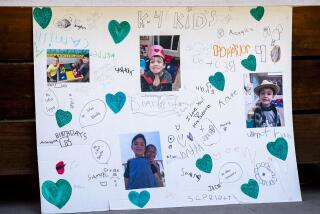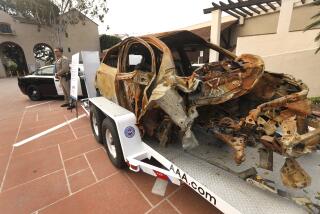Reaching Out by Car Phone Sometimes Is a Little Risky
- Share via
Attention, you (fill in your favorite expletive ) in the ( choose one: Beamer, Mercedes, Lexus ) cutting in and out of traffic on the ( fill in any freeway ) with one hand on the wheel and the other cradling the car phone to your ear.
So what if there is no law requiring drivers to keep both hands--or even one hand--on the wheel? Your chances of causing an accident increase if you’re dialing the office from the fast lane. So says a study--yes, someone conducted a study--titled, “The Effect of Cellular Phone Use Upon Driver Attention.”
Commissioned by the AAA Foundation for Traffic Safety, the study found even casual chitchat on the car phone is distracting--though it is no more so than changing the station on the radio.
Older drivers were twice as likely to be distracted as younger drivers. Overall, the “relative increase in chances of a highway traffic situation going unnoticed ranged from approximately 20% for placing a call in simple conversations to 29% for complex conversations,” the 1991 study found.
That’s not to say car phones are all bad. The author of the AAA report confessed that he bought a car phone for his wife for emergencies.
Indeed, car phones have been used to report carjackings, drunk drivers and traffic accidents--and in the case of the most famous freeway car chase, keep in touch with O.J. Simpson.
*
The California Highway Patrol last year received more than 2 million cellular phone calls reporting freeway emergencies, compared to 29,000 a decade ago. It is not unusual for the CHP to receive dozens of calls reporting the same problem.
Car phone companies donate equipment to schools for use in driver education classes. And make-believe car phones are available for those who cannot afford the real ones.
But car phones have become enough of a concern that the CHP has issued safety tips such as: “Do not take notes or look up phone numbers while driving.”
The National Highway Traffic and Safety Administration has no statistics on how many accidents are caused by chatty drivers but reports that driver inattention and distraction cause a quarter of all crashes.
Administrator Richard Martinez recently said that while the agency plans to study the impact of phone use on driving, there is anecdotal evidence that cellular phone use, particularly the act of dialing, can have a significant impact on driver attention.
Mike Houghton, spokesman for the Cellular Telecommunications Industry Assn. in Washington, said that a University of Michigan study showed that drinking coffee while driving or changing a tape cassette was more distracting than talking on the car phone.
Houghton stressed that a moving car is no place to engage in a heated conversation. Pull over, he recommends. “A high-speed highway is no place to be breaking up a relationship.” CHP Officer Gretchen Jacobs said she has spotted motorists “displaying the driving pattern of an intoxicated driver,” drifting out of their lane. When she has gotten closer, the officer said, she has found drivers on car phones.
“I have stopped people and written them citations for stopping in the center divider to make their phone calls,” she added.
CHP Commissioner Maury Hannigan urged in a recent speech to the cellular phone trade group that the industry work with the Highway Patrol in developing instructions for car phone users on how to report an emergency, including what is and isn’t an emergency.
Some states are experimenting with a secondary number, such as STAR-HP, as a way of separating the “real emergencies” (a medical emergency, a crime, a suspected drunk driver and anyone or anything blocking a traffic lane, including a dog in the freeway) from the “not-quite emergencies” (a hitchhiker on the shoulder and a disabled vehicle on the side of the road during daylight hours).
Officers recommend that drivers buy hands-free car phones. (They are the only kind allowed in some countries.)
But legislators in this country have shied away from regulating their use. Some states have proposed requiring drivers to use voice-activated phones or pull over to the side before using their phones. They have not gotten very far, considering politicians are among the biggest car phone users.
A Florida woman has a unique suggestion:
A three-day waiting period for the purchase of a car phone by men.
“No offense guys,” Margaret Harper wrote in a letter to the Orlando Sentinel. “But you really need to concentrate on one thing at a time. Women can drive a car, talk on the phone, apply makeup and referee the kids while dinner defrosts in the trunk. Men need to limit themselves to one activity at a time. Check out the tie of a man who tries to converse at dinner. It has spots all over it.”
The AAA, cellular phone industry and CHP offer tips on safe use of car phones:
* Before you get behind the wheel, read the phone’s instruction manual and familiarize yourself with the location and function of the phone’s buttons.
* Pull off the road before dialing.
* Have your vehicle fitted with a hands-free or speaker phone.
* Pull off the freeway if the conversation becomes intense, or a business call requires note taking. Do not pull onto the shoulder.
* Dial when stopped if possible. Learn to operate the phone without looking at it. If a number is not programmed and all the digits must be entered, dial in short segments: enter one or two numbers, check the traffic, then dial one or two more.







